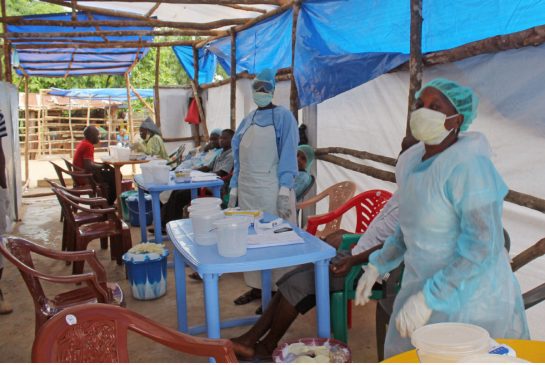
Aid from the British government and other organizations prevented tens of thousands of deaths and infections, but could have saved thousands more.

YOUSSOUF BAH / THE ASSOCIATED PRESS
Findings of a recent study further emphasize how slow the rest of the world was to recognize and react to the unprecedented ebola outbreak that unfolded in West Africa in 2014.
Treatment beds introduced by the British government and various aid organizations in Sierra Leone during the height of the Ebola epidemic prevented an estimated 57,000 infections and roughly 40,000 deaths, according to new findings published this week.
But had that help arrived just one month earlier, researchers said, it could have prevented an additional 12,500 Ebola cases and saved thousands more lives.
“It’s true of any epidemic — the timing at which you intervene makes a huge difference,” said John Edmunds, a professor at the London School of Hygiene and Tropical Medicine and one of the authors of the study published Monday in the Proceedings of the National Academy of Sciences. “We didn’t react quickly enough to this outbreak; I think people accept that . . . [But] if it would have been left unchecked, it would have been truly horrific.”
The findings detail yet again how slow the rest of the world was to recognize and react to the unprecedented public-health crisis unfolding in West Africa. While some aid groups, such as Doctors Without Borders, spent months sounding warnings about the growing outbreak, the World Health Organization and many foreign governments moved far slower than the virus itself.
The epidemic that has ravaged Sierra Leone, Liberia and Guinea for over a year and a half has killed more than 11,000 people and infected more than 28,000. At the height of the outbreak, in mid-September last year, the three countries recorded more than 700confirmed, probable or suspected cases of the deadly hemorrhagic virus in a single week.
Monday’s study underscores that the epidemic did not need to exact such a toll. Researchers found that the 1,500 treatment beds that Britain and various relief groups introduced in Sierra Leone between September 2014 and February helped hasten the decline of the historic outbreak. But they said had those beds arrived only a month earlier, thousands more people likely would have survived Ebola.
At the same time, the report suggests that the outbreak in Sierra Leone could have spiralled even more out of control if not for such a forceful international response. Edmunds said similar effects can be seen in Liberia, where the United States took a leading role in building new Ebola treatment units, and in Guinea, where the French government oversaw foreign relief efforts.
“Our findings show the unprecedented local and international response led to a substantial decline in Ebola transmission,” Adam Kucharski, a study co-author also associated with the London School of Hygiene & Tropical Medicine, said in announcement about the publication. “If those beds had not been in place to isolate the ill and avert further infections, the epidemic could have been much worse.”
The authors acknowledged that calculating exactly how many lives the additional beds saved in Sierra Leone amounts to a bit of a guessing game.
That’s partly because large-scale contributions from governments and global health organizations happened alongside an array of other efforts on the ground. Authorities raced to trace contacts of Ebola patients, local governments undertook massive public-information campaigns, workers tried to ensure safe burials and many people began to change their behaviours as word spread about the transmission of Ebola. Using mathematical models to account for such factors, the researchers estimated the potential impact of the addition of hundreds of treatment beds in helping stave off new infections.
Nearly two years after it began, the Ebola outbreak in West Africa appears nearly over. Not a single person tested positive for the virus during one week earlier this month, the first time that has happened since March 2014, according to the World Health Organization.
In general, the epidemic is considered over in a country when no new cases are identified for 42 days, twice the incubation period of the virus.



